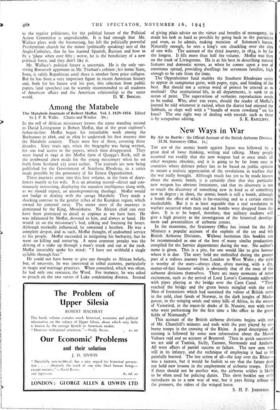Among the Matabele
The Matabele Journals of Robert Moffat. Vol. I. 1829-1854. Edited by J. P. R. Wallis. (Chatto and Windus. 30s.)
IN the roll of African missionary heroes the name standing second to David Livingstone is Robert Moffat, that of the great explorer's father-in-law. Moffat began his remarkable work among • the Bechuanas in 1816, and in :829 he undertook his first journey into the Matabele country. There were five of these, covering three decades. Sixty years ago, when the biography was being written, his son had access to the papers, which then disappeared. They were found in 1941 at the Moffat farm of Quagga's Kerk, still in the ironbound chest made for the young missionary when he set forth from Scotland 125 years earlier. The journals are now being published for the Government of Southern Rhodesia in a series made possible by the generosity of Sir Ernest Oppenheimer.
Three journeys come into this first volume, in the form of diary- letters mainly to his wife. It is an amazing record—direct apd con- tinuously interesting, displaying the soundest intelligence along with, as we should expect, an uncompromising theology. Moffat would not budge in dealing with the savage Matabele. They made a shocking contrast to the gentler tribes of the Kurukan region, which owned his paternal sway. The entire story of the journeys is dominated by the King, Moselekatse. No African chief can ever have been portrayed in detail as copious as we have here. He was infatuated by Moffat, devoted to him, and always at hand. He would sit on the missionary's bed, talking and listening for hours. Although markedly influenced, he remained a heathen. He was a complete despot, and as such, Moffat thought, of undoubted service to his people. Moffat succeeded in mitigating his barbarity, hut he went on killing and tortur;ng. A most common penalty was the driving of a stake up through a man's trunk and out at the neck. Moffat invariably spoke his mind: "I have not withheld a single syllable through fear."
He could not have borne to give any thought to African beliefs, but, of necessity, he was interested in tribal customs, particularly in magic and marriage practices. When consulted, which was often, he had only one resource, the Word. For instance, he was asked to preach on the two verses of Luke condemning divorce. Instead
of giving plain advice on the virtue and benefits of monogamy, he made his task as hard as possible by going back to the patriarchs and even, as he admits, making mention of Solomon's harem. Naturally enough, he sees a king's son chuckling over the idea of one wife. The account of the third journey, in 1854, is by far the longest. It fills more than half the volume. Moffat was then on the track of Livingstone. Ile is at his best in describing natural features and domestic scenes, as when he comes upon a tree of enormous spread, providing dwellings for seventeen families, high enough to be safe from the lions.
The Oppenheimer fund enables the Southern Rhodesian series to appear in sumptuous guise, with paper, type, and binding of the best. But should not a serious word of protest be uttered as to method? Our institutional life, in all departments, is sunk in an ocean of print. The superstition of verbatim reproduction needs to be ended. Why, after too years, should the reader of Moffat's journal be told whenever it rained, when the diarist had enjoyed the Sabbath, or slept well with a "bundle of warm cowdung" on his knee? The one right way of dealing with records such as these






























 Previous page
Previous page